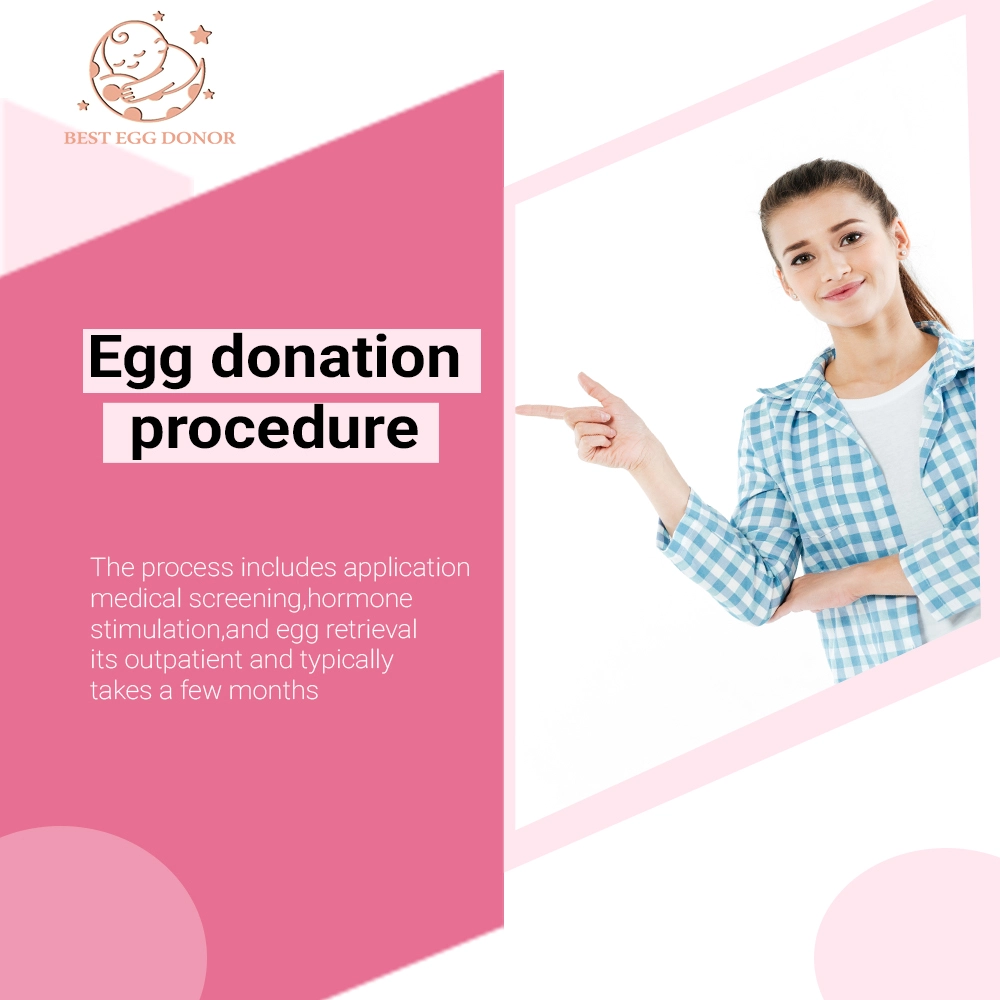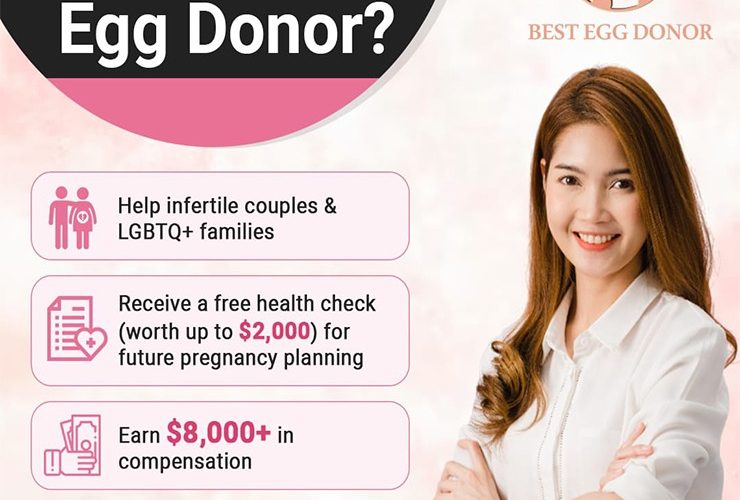Egg donation is a significant component of assisted reproductive technology (ART) which assists people and couples who have been facing the challenges of infertility. Egg donors and recipients should understand well how the process goes in order to make intelligent choices. This guide by Best Egg Donor offers a simple and complete explanation of every step involved in the egg donation procedure, based on expert advice and trusted sources.
What is Egg Donation?
Egg donation is a medical procedure whereby a healthy woman takes her eggs in a move to assist another person or couple to conceive a child. It is a typical process that is applied in IVF (in vitro fertilization) therapies where the recipient cannot utilize his or her eggs due to age, health issues or genetic issues. It is a level of controlled procedure, and includes a number of clinical, legal as well as emotional measures to guarantee safety and success to all the involved parties.
Egg Donation: Step-by-Step Process
Step 1: Initial Consultation and Donor Matching
The Process starts with the consultation at a fertility clinic. Intended parents talk to medical professionals about:
- Reproduction desires
- Health background and examination
- Law and ethical implication
The egg donor is chosen after consultation by the intended parents. Donors can either turn out to be unknown or familiar and they are chosen according to their physical characteristics, health history, education and ethnicity. We have a wide range of thoroughly vetted selection of donors at Best Egg Donor to assist the intended parents to make the most ideal selection.
Step 2: Egg Donor Selection and Analysis
To guarantee quality of the eggs, and safeguard the health of everyone involved, the following donor screening is carried out:
- Medical: The level of hormones in blood, general physical, and the screen of the disease (HIV, hepatitis, etc.)
- Genetic Testing: To identify hereditary multi-generational genetic diseases
- Psychological Assessment: This is a test to determine emotional readiness and is carried through qualified therapists
- Counseling: Information on the national, legal, and emotional parts of egg donation
Step 3: Signing Legal Agreements
Legal agreements must also be signed by the donor and recipient prior to any medical procedures being conducted in which they include:
- Anonymity and confidentiality conditions
- Renunciation of his or her parental rights by the donor
- Monetary compensation (in case this is provided)
- Disclosure provisions to future contact
The legal representation is usually considered to guarantee clarity and complete knowledge.
Step 4: Synchronizing Menstrual Cycles
In order to achieve success with the procedure donor and recipient will be required to synchronize their menstrual cycles. This gets to be done through the binary system of hormone therapy:
- Donors will go through medication to produce lots of eggs
- The recipients also receive estrogen and progesterone to stimulate the uterus lining to receive the implanting embryo
Step 5: Ovarian Stimulation with Hormones
The donor begins a controlled ovarian stimulation (COS) protocol that involves:
- Hormone injections (typically in the form of gonadotropin) daily, a period of 10-14 days
- Regular checkups in the form of transvaginal ultrasounds and blood tests
When the follicles are mature, then a trigger shot (hCG or Lupron) is also administered to complete the process of egg maturation.
Step 6: Egg Retrieval Procedure
Egg Retrieval is a procedure done under sedation with short stay as an outpatient procedure:
- A narrow needle is then introduced to the ovaries by use of the vaginal wall under the help of ultrasound
- Aspiration of fluid is done to retrieve the mature aspects egg in the follicles
It only lasts 15 30min, and donors can normally continue their usual activity 24 48h after the procedure.
Step 7: Fertilizing the Retrieved Eggs
The mature eggs are then fertilized in the laboratory immediately they are retrieved using:
- Conventional IVF: IVF is done in combination of eggs and sperm giving way to natural fertilization
- ICSI (Intracytoplasmic Sperm Injection): Only one sperm cell is injected into an egg, which is commonly applied in a male infertility case
Embryos are grown in 5-3 days. The most excellent embryos are then transferred.
Step 8: Embryo Transfer to the recipient of the embryo to the Uterus
The procedure of transferring the embryo into the uterus of a recipient is simple, straightforward and painless:
- The embryos are introduced in the uterus of the recipient through the use of a catheter
- It does not need any kind of sedation
- The healing process will last 10 15 minutes
Following transfer, it is possible to utilise hormonal support (typically progesterone) to encourage embryo implantation.
Step 9: Post Transfer Care and Pregnancy test
A beta-hCG blood test is administered about 10-14 days after the embryos are transferred to establish pregnancy.
- In case it is positive, early pregnancies care will initiate
- In case the embryo implantation fails, it is possible to utilize frozen embryo transfer (FET) or more cycles of IVF
Understanding Success Rates of Egg Donation
Success Rates of egg donation are usually very high, especially in the case of young and healthy donors. Issues that have an influence on outcomes are:
- The age and health of donor
- Quality of sperms
- Receptiveness of uterus of recipient
- Quality and quantity of transferred embryos
- Medical skills
The studies have reported that the success rate per transfer to be between 50-75 percent.
Risks and Side Effects of the Egg Donation Procedure
While egg donation is safe for most, there are potential risks:
For Donors:
Ovarian Hyperstimulation Syndrome (OHSS)
- Gas or slight pelvic pain
- Unusual post operative complications
For Recipients:
- Hormonal side effects
- Anorexia
- Bulimia
- Mental pressure
- Category of multiple pregnancies
Ethical, Legal, and Financial Considerations in Egg Donation Procedure
The egg donation process is governed by ethical and legal standards to protect both parties. Important points are:
- Wages (deprived according to country and clinic)
- Nondisclosure agreements
- Transfer in law of parental rights
- Nickname system or phrase terms of donation
The existence of legal counsel means that every agreement is legal under local ART regulations.
Conclusion: Is Egg Donation the Right Fertility Options for You?
It is a medical procedure which involves donation of eggs done in a controlled manner and provides an opportunity to numerous individuals to be parents. And no matter on which side you appear, a donor or a recipient wishing to receive a donor egg, knowing every little detail, every stage of the procedure will help you make a confident and well-informed decision.
Visiting a certified fertility clinic, legal consultancy and emotional assessment is essential during this quest. Egg donation with appropriate direction may serve as a successful, moral-ethical and life changing experience.
Best Egg Donor: Your Reliable Ally in the Process of Egg Donation In case you are deciding to go through egg donation, turn to Best Egg Donor and get consultation of a specialist, careful explanation of the procedure, and access to a well-screened donor. We are present to help you all the way to the egg donation experience.
Frequently Asked Question’s
1. How long does the egg donation process take?
Ans. The egg donation process, including initial screening, egg retrieval, and the rest ranges between 6 and 8 weeks.
2. Does egg donation hurt?
Ans. The women are normally put under sedation when the egg retrieval procedure is undertaken; it is not painful. There is incidental cramping or bloating among some of the donors.
3. Does an egg donor have any chance of becoming a mother in future?
Ans. Yes. Egg donation will not affect the future fertility of a woman. Majority of donors would be able to bear children when they are older.
4. What is the compensation of egg donors?
Ans. Payments depend on the country, and the clinic, yet in the U.S., the donors could be compensated between 5,000 to 10,000 dollars or even more by the cycle.
5. Are egg donors subject to age requirement?
Ans. Yes, the majority of the clinics require donors between 21 and 32 years old so that they could donate the highest quality of eggs.
6. What are the egg donation dangers to the recipient?
Ans. Some risks towards recipients can be multiple pregnancies, hormonal effects as well as emotional stress. The fertility specialist should be consulted about all the risks.






